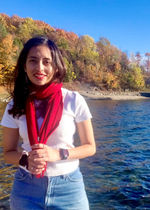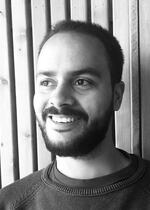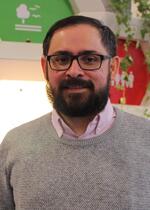IUCN WCEL Early-Career Voices: In Conversation with Aditi Shetye
In this month’s ‘Early-Career Voices’ we sat down with Ms. Aditi Shetye, Executive Assistant of the IUCN WCEL Climate Change Law Specialist Group, and Academic Taskforce Co-ordinator at World's Youth for Climate Justice (WYCJ), to learn more about her exciting path into international climate change law and her experience as an early-career lawyer.
Aditi, you are involved in the WYCJ campaign for an Advisory Opinion on climate change from the International Court of Justice, and you are engaged in the SCELG Climate Litigation Initiative (C2LI); it stands to reason that climate justice lies at the very heart of what you do. Could you please tell us more about your background and career path?
I practiced law in Mumbai, India before I moved to the United Kingdom. My work was focused mostly on civil litigation., I also clerked with a Judge at the Bombay High Court it was mainly on criminal litigation. Although
it was never my intention to work only in the climate space, the opportunities that have come my way over the past year and a half have all been very climate law related. Actually, I am quite keen on exploring other areas of environmental law. I am very interested in human rights, biodiversity and conservation, indigenous peoples and local communities’ rights. And, of course, these are all connected with climate change. In short, I would like to call myself an environmental lawyer, but my current work is rather climate law-related. My dream research project, maybe a Ph.D., would be related to the rights of indigenous peoples and conservation, especially from a post-colonial perspective.
Many early-career lawyers in our network practice law before moving into academia, think tanks, non-governmental organizations (NGOs), or international organizations. What did legal practice add for you?
I do not think I am in a position to say that one should or should not practice law. The path I took, which led me to environmental law, very quickly showed that what happens in academia and high-level policymaking is very different from what is being implemented and away from realities on the ground. That is my struggle with international environmental law. It is amazing that we have academics developing ground-breaking research. Still, when it comes to the village level, reaching the most underprivileged people, we need to consider how this is translatable and how it can be implemented. Legislative execution and implementation take a lot of time and are not straightforward. So, initially, I felt that practice was way more impactful. At the same time, I also realized that research is equally important because you need to build the knowledge base, foster innovation, give space to critical voices to change things for the better. I would like to continue working in a space where I can bridge the gap between these two important areas and promote applied research.
I think you hit the nail. Especially as academics we often find ourselves “preaching to the choir” while the people who are in a position to change things do not read what we publish.
Did you join the WCYJ campaign to take matters into your own hands?
I joined WYCJ as a gateway into climate justice. Way back when I moved to Glasgow (UK), I decided to specialize in global environmental law and governance. My supervisor at Strathclyde University, Professor Francesco Sindico, asked me if I would like to meet two other young people who were trying to campaign for ICJAO initiative and if I would be interested in helping them co-author a legal report. . They were collaborating with other students from eight universities across the world and preparing a legal analysis on why we need an Advisory Opinion from the International Court of Justice (ICJ) on matters of climate change law and human rights law.That’s how it all began. Fast forward to July 2021. We published the first edition of the legal report titled ‘Human Rights in the Face of Climate Crises’ during the High-Level Political Forum (HLPF) in July and we received a good response; people from all over the world started to reach out to us and expressed interest in the initiative. We then learned that the Government of Vanuatu was interested in taking this initiative for an Advisory Opinion forward. We officially launched the initiative with Pacific Island Students Fighting for Climate Change (PISFCC) at the 26th meeting of the Conference of the Parties to the United Nations Framework Convention on Climate Change (UNFCCC), and it became a global movement and started getting people together, mostly students in their final years of law school, to mobilize in Africa, Latin America, Asia and Europe. In 2022, we registered the campaign as a charity in the Netherlands. It was all volunteer work, and it still is to a large extent. We also put a lot of thought into how we present our work. Since we had to mobilise support in States from across the globe, disseminating information in support of the ICJAO initiative had to be tailored for various audiences. Based on the legal report we had to prepare short/key messages to get support from the civil society, NGO networks thus campaigning for the initiative along with PISFCC.
Where are you now with the campaign, and where is it headed?
Once Vanuatu and the core group of States make the zero-draft the resolution public, it is due to be tabled for a vote at the UNGA on 14th December 2022. After the vote, the next phase of the campaign will move to The Hague. We are looking at how NGOs which have Public Interest and Climate Justice at their core can supplement the advisory proceedings. WYCJ along with its campaign advisors and the Sabin Centre for Climate Change Law is in the process of drafting a ‘Youth Green Book’. This document is aimed to serve the purpose as White Papers do. It will contain the necessary information about the ICJ advisory procedure and an analysis of the legal question which is to be asked to the court. We hope that this document is comprehensive and provides States, government bodies, adjudicating authorities, lawyers, academics, and civil society with how such an Advisory Opinion will be the right step in the direction of climate justice.
What is next for you? You mentioned a Ph.D.?
When I first came to the UK, I had no idea how to work in environmental governance sector, especially internationally. I came from a rather conservative university method with a strict student-teacher relationship which meant that career progression could only be linear. Working with my Professor in Glasgow and with various NGOs and think tanks, I realized there are many possibilities for working in the sector, and that I do not necessarily need to do a Ph.D. I am saying this with a pinch of salt because I still have this feeling that I need to do a Ph.D. to be taken seriously.
Are others making you feel this pressure, or is it something you put on yourself?
I have had this conversation in my head for almost two years now. It is not like I do not like to do research. I really enjoy it and realized this even more during my LLM, where I also got the opportunity to work as a research fellow with UNEP’s Ozone Secretariat providing legal analysis. My struggle with research is about its application. Coming from legal practice, for me to do a Ph.D., I feel the need to do something that is really new or groundbreaking, and that can be actually applied. Until I can do that, I am a bit reluctant at the moment to commit to a full-blown Ph.D.
You mentioned human rights, IPLCs, and conservation as possible topics? What attracts you to these issues?
I worked on a short-term project with Giulia Sajeva. She spoke to me about the rights of self-determination, biological and biocultural rights and how this affects conservation. Being born and brought up in India, even though I lived in a city like Mumbai, I have roots in the coastal communities because my family is from the Western coast of India. I witnessed significant changes in urban development where people have been removed from their land by development projects and companies without compensation or rehabilitation and violating their fundamental occupational and cultural rights. While this is a global phenomenon, I am speaking for India because I do not know the reality on the ground in other places. But even from my readings, I can see the parallels that the same (colonial/capitalist - Westphalian) conservation models are still being implemented in Australia and Africa where indigenous peoples and local communities, who are the guardians of biodiversity and harbor traditional knowledge, are being displaced leading to those areas formerly under their care being subject to severe environmental degradation. Apart from, climate change law, these are the sort of issues that motivate me to do research.
Would you identify yourself as a Global South scholar? Where do you locate your voice?
That is a very good question and an important one. I identify myself as me coming from India. But India is a massive country, with 28 states and eight union territories. In casual conversations I explain to my non-Indian friends by comparing India with the European Union, because it has so many different states and languages. I
always clarify that this is my individual perspective on any issue in conversation. And my perspective is definitely Indian, but only part of the whole mix. I will only speak for a community or area that I know, that I identify with, that I have dealt with firsthand, knowing full well that this perspective cannot be very straightly transferable even to the North Eastern part of my country because culturally we are different people and cannot possibly have identical solutions even to similar issues. So, if you ask me whether I see myself as a scholar from a developing country – I actually do not see myself as a ‘scholar’ at all but I do come from a new comparatively new and developing country. I have a long way before I could reach the stage of getting that accolade. On a very personal note, I do find it kind of disrespectful when people from the Global North write about issues that are going on in developing and under-developed countries even now. I think it is critical for a person from there to voice their perspective on the facts on the ground. Certainly, if such scholars have studied the area and the community they will get a lot of things correct and there is a certain amount of truth to the study, but still – and I mean no disrespect – we do not want you to do that. We are here to do that now with our first-hand experience and interest.
Have you taken advantage of any early-career opportunities or networks, communities of practice or mentorships that helped you get started on your path?
That is a very tricky question because I think I am still a “baby” in this whole massive field. I think COP26 was a key point in my transformation on my career journey. I met a lot of inspiring people through my LLM supervisor (Professor Francesco Sindico) and his networks. And I wanted to speak with someone who has not done a Ph.D. and is making a living successfully in the environmental law field. So I was fortunate to meet Ms. Sarah Mead who has been of great help, providing me with guidance on how to approach employment opportunities, helping me find the sort of work I could do, and even encouraging me to publish about my engagement with the WYCJ campaign in a peer-reviewed journal. She put me in touch with Professor Tony Angelo, who agreed to publish the article I wrote in a journal of which he is an editor. In effect, through this kind of snowballing, my network began to grow.
Building your network helped you land opportunities, but you also stepped outside your comfort zone to seize them.
Yes. I basically jumped at whatever I could get. But looking back at the past year and a half, I learned that I also needed to approach people and to learn to market myself. Coming from India, this almost opportunistic way of marketing yourself and your work is a very different culture from what I was taught. When you network you try to build connections, but it is also to get employed. This was an important piece of advice I got from one of my mentors, because it made me reflect on how I look at myself and my work and so I am trying to embrace it.
Aside from a Ph.D. I am currently working with BIICL as a researcher on the Corporate Climate Litigation Project and I continue to volunteer my time to WYCJ and IUCN WCEL. Being part of a booming network such as the IUCN World Commission on Environmental Law has been really helpful. I would advise any early-career professionals or young scholars to get involved in its activities, to try to talk to as many people as you can, and above all, be persistent.
If you would like to learn more about the World’s Youth for Climate Justice campaign for an Advisory Opinion from the ICJ, go to https://www.wy4cj.org/.
IUCN WCEL Early-Career Voices features interviews with, testimonials and commentary by early career environmental lawyers working on inspiring projects and sharing their unique experiences and offering advice to their fellows. The series is hosted by Mr. Patrick Toussaint and Mr. Adrian Martinez-Blanco who co-lead the IUCN WCEL Project on Networks and Partnerships.
______________________________________________________________________________
Links:
Link to WYCJ legal report: https://static1.squarespace.com/static/5f063a0c8f53b604aed84729/t/60e53dd9d93f1a66fb57edad/1625636347082/Human+rights+in+the+face+of+the+climate+crisis%3A+a+youth-led+initiative+to+bring+climate+justice+to+the+International+Court+of+Justice
______________________________________________________________________________
About the authors:

Aditi Shetye is a lawyer from Mumbai and currently works as a researcher at the British Institute for International and Comparative Law (BIICL). She is an executive assistant for the Climate Change Law Specialist Group (CCLSG), WCEL IUCN and the Academic Taskforce coordinator for World’s Youth for Climate Justice (WYCJ). Her work focuses on international climate change law and its integration with human rights law and climate change litigation.

Patrick Toussaint is an Associate Expert with the UN Convention on Biological Diversity. Before he worked as a Research Associate with the Institute for Advanced Sustainability Studies (IASS) Potsdam on climate, clean air, and sustainable development law and policy, as well as Managing Editor of the peer-reviewed law journal Carbon & Climate Law Review. Patrick’s work and research interests comprise cross-cutting and boundary issues that drive the global effort to protect nature, human rights and achieve climate justice. Patrick is also completing a doctoral thesis on climate justice and loss and damage from the University of Eastern Finland.

Adrián Martinez-Blanco is the Director and founder of the Costa Rican NGO La Ruta del Clima and Co-Coordinator of the Climate Action Network (CAN) Loss and Damage Working Group. He is a PhD candidate in international climate change law at the University of Eastern Finland, and an alumni of the Alexander von Humboldt International Climate Protection and IASS Fellowship Programmes. He graduated from a Master in Environment, Development and Peace from the United Nations University for Peace. Adrián’s work and research interests include public participation, human rights, loss and damage, and international climate law.
